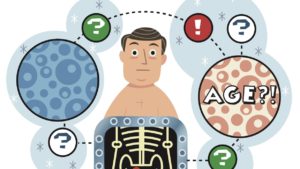
March is Prostate Cancer Awareness Month so Professor Peter Wiklund, a world leading expert in prostate cancer of the Department of Molecular Medicine and Surgery at Karolinska University Hospital, in Stockholm, Sweden, has shared 8 things most men don’t know about prostate cancer.
1. Treatment side effects may impact on same-sex relationships
Men with prostate cancer treated with external radiation therapy may develop an inflammation of the rectum called proctitis. The condition causes rectal pain and bleeding, making intercourse difficult for men in same-sex relationships. As a result, both partners may experience high levels of anxiety, which may ultimately put a strain on intimacy and the relationship.
2. Prostate cancer is one of the most hereditary cancers
Having a first-order relative, such as a brother or father, with prostate cancer doubles the likelihood of developing the condition. Family history is, in fact, the strongest risk factor for prostate cancer. Other factors include increasing age and ethnicity; for example, African-American men in the US are more likely to develop an aggressive prostate cancer than Caucasian men.
3. Diet and sexual activity may not be as protective as one thought
There are a lot of scientific studies discussing the link between prostate cancer and diet but they’re lacking a proven link. Similarly, no conclusive link has been found to date between increased sexual activity and reduced risk of prostate cancer.
4. Participation in a clinical trial gives access to innovative treatments
If you have been diagnosed with prostate cancer, taking part in a clinical trial may give you the opportunity to receive innovative treatments, potentially improving your chances of a positive outcome. Several new therapies are currently being tested, including novel chemotherapy drugs and hormone treatments. Alivia Swiss Health offer a clinical trial matching service, this service is designed to help patients scour through thousands of clinical trials worldwide and attempt to find one well suited to the patient. A doctor can advise the potential benefits and risks of being treated as part of a research study.
5. A second opinion can make a significant difference to patients like offering new treatments such as Robotic Surgery
It is important that men seek a second opinion after being diagnosed with prostate cancer. A reason for this is that there is presently no real consensus on what is the best first-line treatment for the condition. For example, older men are more likely to achieve better outcomes with radiation therapy. However, for younger patients, surgical removal of the prostate gland (prostatectomy) is probably the most effective treatment. Some research also suggests that surgery is associated with higher survival rates than radiation therapy. Plus, there are other available treatment options you may want to consider, such as robotic surgery – an advanced form of keyhole surgery that allows for faster recovery times and has been shown to improve patient outcomes. Seeking a second opinion from a urologist or oncologist can help you and your doctor make a more informed decision about what is the best treatment for you.
6. Surgery and radiation therapy have different side effects
If you need treatment for prostate cancer, it may be worth considering whether you are more suitable for radiation therapy or surgery, in terms of side effects. Common problems with radiation therapy include rectal bleeding, fatigue and inflammation of the bladder. Additionally, even with the latest technology, there is a small chance that healthy tissues surrounding the prostate may be irradiated and develop secondary cancers as a result. The main potential side effects of surgery are urinary incontinence and erectile dysfunction (impotence). This is because removing the prostate may affect the muscles that contribute to bladder control, as well as the nerves and blood vessels needed to develop or sustain an erection.
7. Patients can reduce their risk of side effects from treatment
While it is not always possible to completely avoid incontinence and impotence after prostate cancer surgery, there are steps you can take to lower your risk of developing these side effects or effectively deal with them if present.
• Choose your surgeon wisely. Experienced surgeons are more likely to preserve their patients’ continence and potency.
• Avoid cigarette smoking. There is evidence to suggest that the risk of developing erectile dysfunction is greater among smokers than non-smokers.
• Follow a healthy lifestyle. Eating healthy, exercising regularly and losing excessive body weight lower your chances of developing high blood pressure, high cholesterol and heart disease – all of which are well-known risk factors for erectile dysfunction.
• Consider strategies that help prevent or alleviate incontinence symptoms. These include practicing Kegels exercises, which involve tensing and relaxing certain muscles of the pelvic floor. Medicines and surgery may also be beneficial.
8. Organised screening could save lives
Men who are worried about the health of their prostate can have a blood test that measures the levels of a protein known as prostate specific antigen (PSA). High levels of blood PSA may indicate the presence of prostate cancer. A PSA blood test can be combined with other medical investigations, such as biopsies and rectal examinations. According to research, performing these tests routinely, as part of an organised screening programme, has the potential to reduce mortality from prostate cancer by almost 50 per cent. Thanks to PSA screening, in Sweden prostate cancer mortality has already been reduced by 30 per cent, and we expect to achieve a further 30 per cent reduction, as the screening programme becomes more established.
While the possibility of false negatives cannot be completely eliminated, having your PSA measured, and following up with a biopsy if needed, may reduce your risk of dying from prostate cancer.
Alivia Swiss Health, with their HQ now in London, is the UK’s only health management service that offers completely personalised, objective and independent advice and assistance on a global scale. Alivia Swiss Health’s expertise spans more than 200 different types of cancer, in addition to a number of autoimmune diseases and many other serious illnesses and diseases.
For more info, visit Alivia Swiss Health online: www.alivia.com
National wellbeing has dipped to the lowest levels since records began. But, no matter where we’re at, we can rebuild our mental and physical fortitude. One way […]
Whilst some couples will have no problems falling pregnant naturally, according to the latest NHS statistics approximately one third of couples will struggle to conceive due to […]



